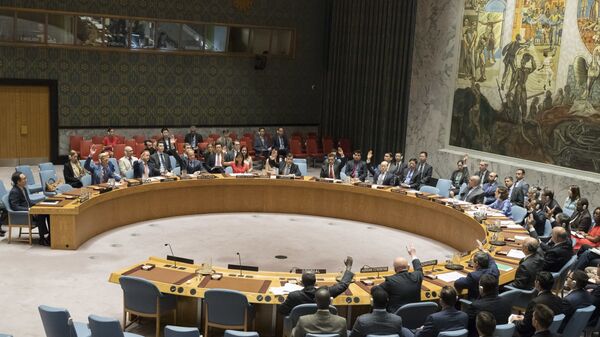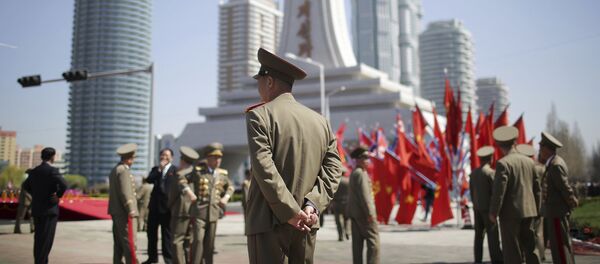The North Korean government rejected the new sanctions harshly on Monday and promised retaliation, the state-run Korean Central News Agency (KCNA) said in a statement.
"The Democratic People's Republic of Korea (DPRK) condemns in the strongest terms and totally rejects the anti-DPRK ‘sanctions resolution’ of the UNSC rigged up by the United States and other hostile forces as a wanton infringement upon the sovereignty of the country," the statement said.
North Korea vowed to "make the United States pay dearly for all the heinous crime it commits against the state and people of this country."
Pyongyang’s defiance amid increasing pressure from the international community proves it is critical for great powers such as the United States, China and Russia to set aside their differences and form a united front in resolving the nuclear crisis on the Korean Peninsula, experts told Sputnik.
"If great powers are responsible, they should avoid throwing jabs at each other. The United States needs to stop pointing fingers at China or Russia. Facing increasing nuclear threat from North Korea, China and Russia also should avoid making the United States their biggest enemy on this issue. The great powers need to be responsible by standing united to push for denuclearization on the Korean Peninsula," Zhang Liangui, an expert on North Korea at the Central Party School in Beijing, told Sputnik.
After his initial efforts to work with Chinese President Xi Jinping on North Korea failed, US President Donald Trump started to criticize China for not doing enough to rein in its increasingly aggressive neighbor through messages on Twitter. Trump said he was "very disappointed in China" in a tweet following North Korea’s latest missile test on July 28.
FRICTION AMONG GREAT POWERS
Despite the fact that Pyongyang often specifically targets Washington in its rhetoric, nuclear North Korea poses a major security threat not only to the United States, but also to neighboring nations in East Asia including China and Russia, the Chinese expert explained.
"The United States is not the country that suffers the most from a nuclear North Korea, because it is so far from Pyongyang. No matter its military or environmental threat, the United States has enough measures to protect its security. The countries that are closer to North Korea, such as South Korea, China and Russia, will be the ones that could be hurt the most by Pyongyang’s nuclear arms program," Zhang said.
Zhang pointed out that the missile test conducted by North Korea on May 14 could be interpreted as a strong message for China, because on the same day 29 head of states gathered in Beijing for a summit on the nation’s One Belt One Road Initiative. The flying distance of the missile was about 787 kilometers (489 miles), which is close to the distance of 808 kilometers (503 miles) between Beijing and Pyongyang.
By designating the United States as the primary target of its nuclear arms program, North Korea tried to take advantage of the friction among great powers to seek more space for the development of its nuclear weapons, the Chinese expert argued.
"As a global superpower and often acting as the world’s police, the United States has a lot of conflicts with China and Russia. North Korea is trying to take advantage of this by winning sympathy from some in Beijing and Moscow," Zhang said.
During Chinese President Xi’s official visit to Russia in early July, the foreign ministries of the two countries released a joint statement expressing their willingness to coordinate their efforts in resolving the nuclear crisis on the Korean Peninsula.
NECESSARY PRICE
Chinese Foreign Minister Wang Yi said on Tuesday that China, as a main trade partner of North Korea, was ready to pay the price for implementing the new UNSC sanctions against Pyongyang to safeguard the international nuclear non-proliferation system and maintain regional peace and stability.
Zhang suggested the economic prices were necessary for China’s security.
"It’s absolutely acceptable and necessary to pay economic prices for national security. Just like when we defend our borders, soldiers may lose their lives. But for the sake of national security, this is the kind of price we must pay," he said.
Chinese companies trading with North Korea, especially those involved in illegal trade activities, need to be ready to make sacrifices for China’s national security, Zhang argued.
Local police in the Liaoning province said in a statement in September 2016 that they started to investigate a Chinese company in Dandong for serious economic crimes. The owner of the company under investigation was Ma Xiaohong, who was charged by a criminal complaint from the US Department of Justice in August 2016, for violating US sanctions related to North Korea.
ARMS RACE IN EAST ASIA
In addition to making defiant statements, North Korea could respond to the newly introduced sanctions by accelerating the progress of its nuclear arms program, before the impact of the sanctions could materialize, South Korean experts in Seoul told Sputnik.
"The more time you give to the sanctions, the more likely they’re going to have a greater impact. To race against the time, they might want to speed up the development [of the nuclear arms program]. One scenario is they could increase the frequency of the tests and make them bigger and bigger," James Kim, an international relations expert at the Asan Institute for Policy Studies in Seoul, stated.
Kim argued that South Korea might need to boost its military spending if North Korea continued to develop its nuclear arms program.
"If North Korea continues on its path, South Korea has very little option, but to increase the level of its own deterrence, because there is now an imbalance in the deterrence capabilities in different countries in the region. That means greater investment in national security and defense [for South Korea]. You’re probably going to see China do very similar things and Japan would do the same as well," Kim stressed.
However, the South Korea expert believes it is impossible for authorities to Seoul to pursue a nuclear arms program due to economic and political restraints.
"South Korea has a standing commitment on the Nuclear Non-proliferation Treaty (NPT). From a cost standpoint, I think it’s just too big. Exiting the NPT would mean sanctions for South Korea. From an economic and political standpoint, it’s just not a feasible option," Kim pointed out.
The expert concluded by saying that South Korea might want to invest in conventional military capabilities that allow them to get on par with North Korea to address possible threat from Pyongyang.




